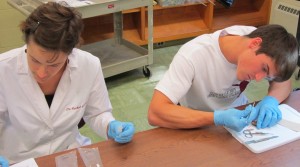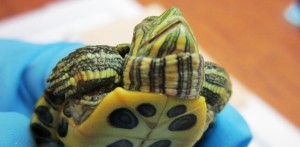Francis Polakiewicz (’14) and Dr. Rachel Goodman recently wrapped up an experiment investigating interactions between chemical exposure and a wildlife disease on the health and survival of turtles. The two were awarded a Hampden-Sydney Student Faculty Summer Research grant for the project, and Polakiewicz was also awarded a Virginia Foundation for Independent Colleges Summer Undergraduate Science Research Fellowship Award. In their experiment, juvenile red-eared slider turtles were exposed to combinations of the emerging infectious disease ranavirus and four commonly used herbicides: Roundup, ShoreKlear, 2,4-D, and Atrazine. Polakiewicz and Dr. Goodman studied the growth and survival of turtles in these treatments for 5 weeks. Collaborator Dr. Debra Miller at the University of Tennessee Knoxville is currently examining tissues for evidence of infection and organ deterioration. Results of this study will help determine why some wild turtle populations carry the virus symptomatically, while others experience virus-associated dieoffs. If certain herbicides cause increased morbidity and mortality, this information could inform application practices of land managers.
Biology Department
individually tailored preparation for graduate and professional work


